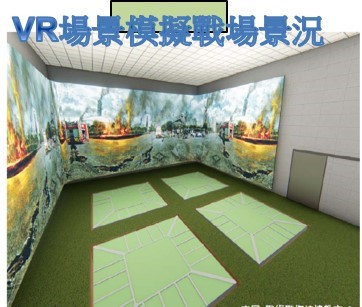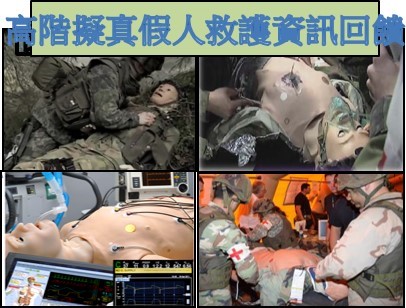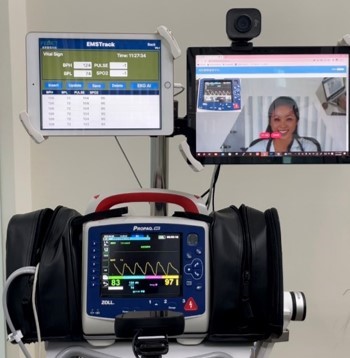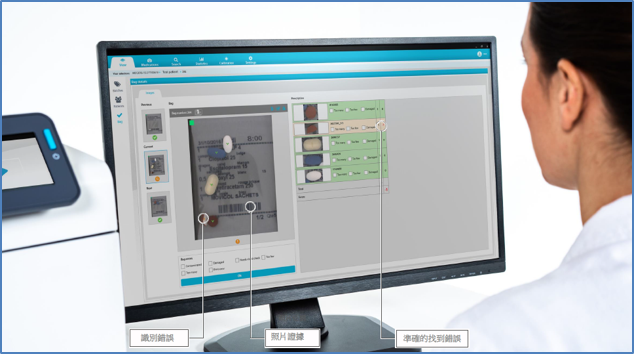
The Military Health System is adopting VR, AI and 5G to enhance its scalability and ability to deliver medical service (Photo by Medical Affairs Bureau)
The Military Health System of the Ministry of National Defense (MND) not only provides medical care but also takes responsibility for diagnosis and treatment of the wounded. It is always prepared to provide medical care on the battlefield or in the war zone. The Medical Affairs Bureau (MAB), part of the MND, is participating in the Healthcare+ Expo with 14 affiliated hospitals, including the National Defence Medical Centre and the Tri-Service General Hospital, to showcase innovative technologies used in various scenarios. These include the latest virtual reality (VR) simulations that realistically depict different military branches, transport vehicles and battlefield rescue scenarios. It provides an insight into how the military is using advanced technologies such as VR, AI and 5G telecommunications to enhance various military medical practices and applications.
VR and Smart Glasses Simulating War Scenarios
Imagine the following situations through VR: Slowly descending to 30 metres underwater, entering the narrow passageway of a military ship and transporting the wounded; next scene jumping onto the battlefield under enemy fire, urgently performing rescue tasks such as intubation and haemostasis on the wounded at the front line.
Traditional training for trauma care mostly involves face-to-face instruction using simulated mannequins, making it difficult to achieve remote guidance or scenario changes. The National Defense Medical College, commissioned by the National Chung-Shan Institute of Science & Technology, has developed a visual simulation training system for the battlefield. Using VR and AR projected on walls, it can simulate scenes such as a highway accident, tunnel explosion, or various vehicles like helicopters, armored vehicles, and ambulances that may appear on the battlefield. This is done to simulate trauma care skills, integrating the training evaluation system into an AI model framework. Besides effectively reducing training costs, it enhances the efficiency of rescue training. The development is ongoing, with various rescue scenarios being created. Many firefighting and rescue units have been applying for access to the training center to conduct emergency rescue training in different scenarios.


VR training is stimulating different scenarios, where medical care requires skilled forces to deliver (Photo by Medical Affairs Bureau)
AI-assisted Intubation During Wartime
In wartime scenarios, with injured individuals lying on the ground and the challenges of narrow spaces and time pressures, maintaining the precision and stability of endotracheal intubation becomes even more difficult. MAB has developed the use of AI recognition to alert medical personnel to the correct position of endotracheal intubation and provide warnings when deviating from the correct intubation pathway, effectively improving the success rate of intubation.
This system demonstrates high efficiency in real-time vocal cord detection in laryngoscope images. It is not only applicable in combat situations, but can also help less experienced physicians to perform intubation correctly. In addition, it helps physicians to quickly identify the position of the vocal cords, thereby speeding up the intubation process.
AI and MR Combined Offering Medical Consultation and Sea Ambulance
Unlike other branches, the Navy may face greater challenges in providing medical assistance on naval vessels at sea. The Kaohsiung Armed Forces General Hospital's Zuoying Branch, in collaboration with China Ship Building Corporation (CSBC) Corporation Taiwan and Far East Medical Electronics Technology Limited, has established a maritime remote smart medical and smart drug administration service platform. This platform integrates vital sign data, AI interpretation, and multi-party digital video consultations with mixed reality (MR) technology, providing a comprehensive interface for emergency consultations and medical command.
When a seafarer is injured, AI can instantly interpret vital signs on the spot and summon an emergency physician for a video consultation, incorporating MR technology to achieve the same effect as an on-site consultation. After the diagnosis, the physician can issue a prescription, which is transmitted via satellite to the ship. The intelligent medicine cabinet's built-in system receives the prescription content, and authorized personnel, such as medical officers, can obtain the medication from the intelligent medicine cabinet after authentication, providing it to the injured crew members at sea.

Remote consultation with real-time vital signs monitoring (Photo by Medical Affairs Bureau)
In addition to military and trauma care training, MAB has grown its expertise in medical research. Collaborating with more partners, the focus is on three areas: AI in healthcare, smart pharmacy and novel drugs.
★★★More by Medical Affairs Bureau
◎AI in Healthcare: Targeting prognosis of Gliomas, Heart Failure, and Osteoporosis Diagnosis
By training AI systems with a vast amount of image data, it can identify proliferative blood vessels to predict the prognosis of gliomas, analyze electrocardiograms to enhance disease diagnosis accuracy and examine chest X-rays to determine the risk of heart failure and osteoporosis.
For instance, in the study of atrial fibrillation (Af), the accuracy of interpretation is 94.3%, surpassing the electrocardiogram equipment's linear analysis interpretation accuracy (73-77%). Additionally, using AI to interpret X-rays of children's hand bones allows for understanding growth curves, enabling outpatient clinics to provide more precise diagnosis.
◎Smart Pharmacy: AI-assisted Medication Management
The management system automatically identifies the drug name, dosage and other key information, warning of easily confused drugs and distinguishing between correct and incorrect drugs. The information is synchronised with the hospital's HIS system, integrating the medication checking process and significantly improving medication safety.

AI-assisted medical management with essential information on drugs (Photo by Medical Affairs Bureau)
The pharmacy, during the compounding and dispensing stages, can also utilise AI to recognise the information of medications inside the drug bag and read the prescription barcode on the drug bag. This assists pharmacists in verifying whether the drug name, dosage, quantity, etc., match the prescription.
◎Novel Drugs: Rho Protein Accelerated Drug Screening for Infectious Disease
Emerging infectious diseases continue to pose an ongoing threat to global public health, and the process of screening antiviral drugs against high-risk pathogens is both dangerous and time-consuming. The Rho protein technology developed by MAB effectively enhances the signalling of the minigenome system and increases protein production. In the future, it can be integrated with AI automation systems to become a powerful tool for screening antiviral drugs against high-risk pathogens.
B2B Opportunities with Medical Affairs Bureau
AI in Healthcare
| Products/Solutions | Partnership wanted |
|---|---|
| AI-aided pathology diagnostic system: quantification of proliferative vasculature for improved prognosis of brain tumours | Tech-licensing; product development |
| AI-aided endoscopic imaging analysis system: Use of hyperspectral imaging to identify early esophageal cancer images | Tech-licensing; product development |
| AI-aided in ECG Analysis, combined with wearable devices to offer at-home ECG measurement | Tech-licensing; product development |
| AI-aided assessment of bone age | Tech-licensing; product development |
Digital Health
| Products/Solutions | Partnership wanted |
|---|---|
| AI-assisted intubation | Tech-licensing; product development |
| VR and smart glasses simulating war scenarios | Software and product sales |
| AI and MR combined medical consultation and sea ambulance | Software and product sales |
| Fibre-optic, AI-assisted sleep apnoea detection, with nFOPT® technology | Tech-licensing; product development |
Innovative R&D
| Products/Solutions | Partnership wanted |
|---|---|
| Development and application of SERS substrates: A cost effective, rapid, high sensitivity and high throughput approach for the detection of small molecule compounds applicable to drugs, food, forensics, etc. | Tech-licensing; product development |
| Computer-aided diagnosis of posterior circulation stroke: Modified pc-ASPECTS includes the brainstem and calculates the area of infarction in each brain region, rather than focusing only on the presence of infarction in specific brain areas | Tech-licensing; product development |
| Intelligent hyperspectral image analysis to predict the location of small bowel bleeding: Combined with AI to identify early oesophageal cancer images for accurate lesion detection | Tech-licensing; product development |
| Rho protein application: This novel technology effectively enhances the signal of the minigenome system and increases protein production, which can be integrated with AI automation systems to become an intelligent tool for screening antiviral drugs against highly dangerous pathogens | Tech-licensing; product development |
New and About
| Products/Solutions | Partnership wanted |
|---|---|
| Subthreshold brain stimulation for schizophrenia: Uses 3D electric field simulation and positioning to guide placement of multiple electrodes on target brain areas to improve symptoms of schizophrenia that are often not effectively treated by conventional treatments | Tech-licensing; product development |
| Ultrasound-guided, needle-free injection for the treatment of sudden hearing loss. This is a thermosensitive hydrogel with a viscosity capable of inducing cavitation effects to assist in the sustained release of drugs | Tech-licensing; product development |
Medical Affairs Bureau, Ministry of National Defense at Healthcare+ Expo 2023
- Thursday, 30 November to Sunday, 3 December
- Booth No. J618 | 1F, TaiNEX 1
